Facebook takes down Iraq-focused pages
Some of the pages pushed pro-Saddam Hussein content, were critical of the current Iraqi government and the United States
Facebook takes down Iraq-focused pages
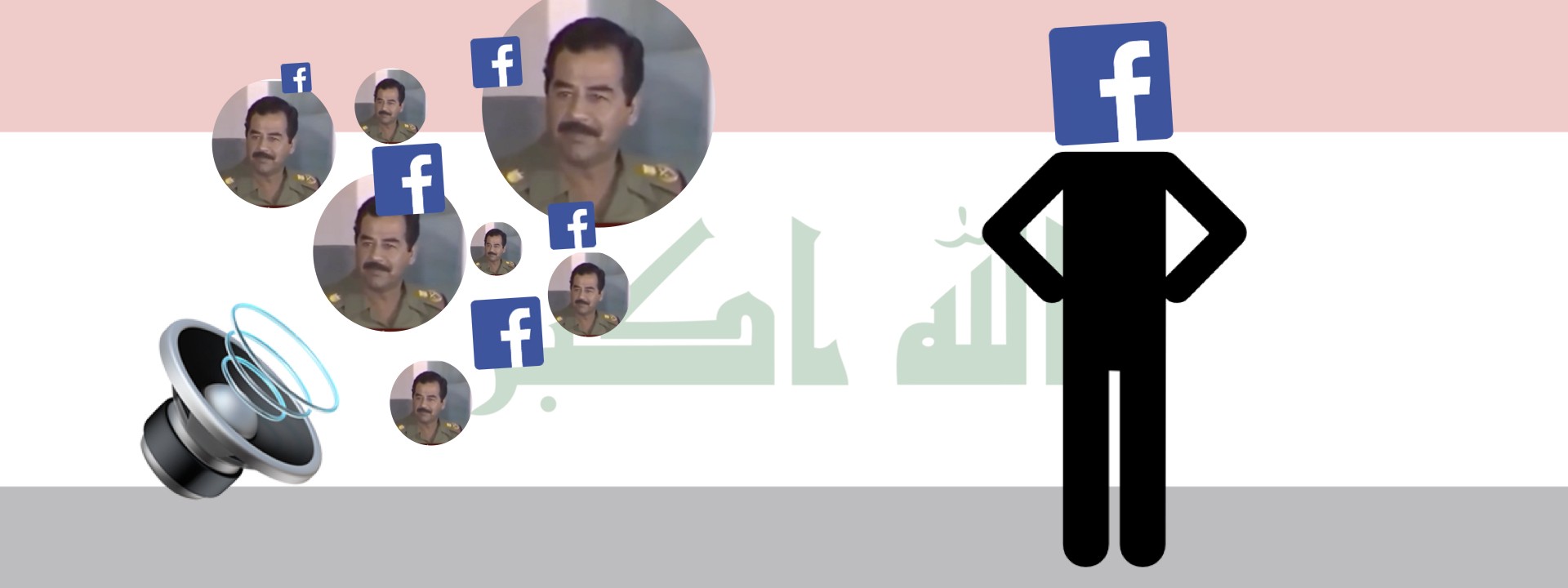
BANNER: (Source: Eto Buziashvili/DFRLab via Worldatlas; Facebook)
On September 16, 2019, Facebook removed 206 assets engaged in coordinated inauthentic behavior and focused on Iraq, with a particularly pro-Saddam Hussein angle in much of its content.
In its announcement, Facebook stated:
The Page admins and account owners typically posted about domestic political and societal issues such as religion, various public figures including Saddam Hussein, the state or the military under the Saddam rule, tensions with Iran, the U.S. military action in Iraq, Iranian-backed militia operating in Iraq, and Kurdish-Iraqi politics.
The DFRLab had access to nine of the pages prior to their removal. As with Facebook’s announcement, the DFRLab found that the pages targeted a domestic Iraqi audience, spreading divisive sociopolitical content that attacked the current Iraqi government, promoted the former military elite under Saddam Hussein, and characterized the United States as an occupying force within the country.
The majority of the removed pages had a high number of followers and amassed significant engagement. The DFRLab also found some evidence of coordination, as several of the pages amplified each other’s posts.
Army-focused and promoting Saddam Hussein and the military elite
The Facebook page “Brave Iraqi Army” (الجيش العراقي الباسل) was created in September 2014 under the name “I love my life62.” Since its creation, however, it changed its name three times, first in March 2016 to “I love you J” and second in June 2016 to “I love yo.” In July 2019, the page changed its name a third time to “Brave Iraqi Army.”
In September 2016, another Facebook page, “Bird of Peace,” was created. A post pinned to the page’s timeline stated that ever since U.S.-led forces captured Baghdad in April 2003, a fierce and systematic operation has been underway to falsify the history of Iraq, spearheaded by the new generation of Iraqi officials. The pinned post said that the administrators of the page created it to fight against the falsification of Iraqi history by raising public awareness and communicating “true information.” The post also claimed that students provided information to the managers of the page, while somebody by the name of “Professor Ghassan Mazen” oversaw the page and added “additional flavor to the text.” Each post is signed off with the surname “Al-Jabri.” A preliminary search online for Professor Mazen in both English and Arabic yielded no conclusive evidence of such a person’s existence.
A very similar post, with a few minor additions and omissions, about the creation of the Bird of Peace page appeared on the Brave Iraqi Army page in November 2018. The administrators pinned this post as well.

The About section of both pages suggested they published information about members of the former Iraqi army. Both pages provided a link to the same blog, also called Bird of Peace. Furthermore, the Brave Iraqi Army Facebook page also linked to a YouTube channel, “Shadow Men” (رجالالظل), that features numerous videos devoted to Saddam.

According to its Page Transparency section, Bird of Peace had 19 managers, of which 16 had their location hidden and the remaining three had locations of Belgium, Egypt, and Iraq. Meanwhile, Brave Iraqi Army had five managers, two of whom were based in Iraq and three of whom had their location hidden.

The pages often shared each other’s posts, and the same content frequently appeared on both pages, indicating that they either shared managers or were coordinating closely. Bird of Peace’s posts gathered more engagement than Brave Iraqi Army’s, despite the fact that the former only had 230,000 followers, while the latter had roughly 895,000.

Since the Brave Iraqi Army page had changed its name three times, it may have gathered its significant audience under a previous name. The DFRLab could not access an extended timeline history of the page to check what sort of content it had posted under its previous names.
The posts on both pages mainly included photos of Iraqi forces during Saddam’s rule, accompanied with text.
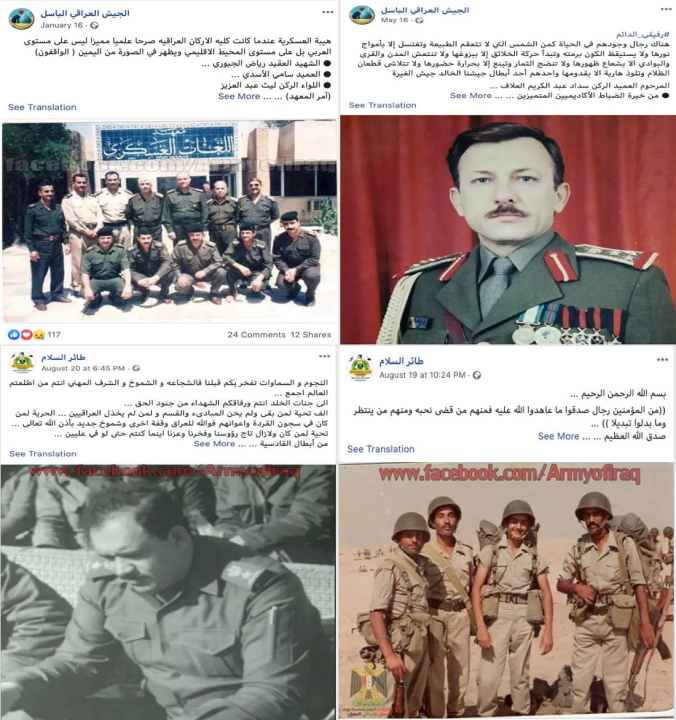
Some of the posts expressed anti-American sentiment, recounting how America occupied Iraq in 2003 and insisting that those who resisted foreign aggression against Iraq should be showered with eternal praise. According to the posts, former U.S. President George W. Bush was a criminal and the emergence of terrorist groups in the region was revenge for what the United States did to Iraq.
The description accompanying one of the photos claimed that the pictured individual had created paramilitary groups after the American invasion of Iraq in 2003 and attacked strategic American assets in different parts of the world, generating big losses for the United States. Another post was devoted to former Iraqi Minister of Defense Sultan Hashem Ahmed, who was in office during the U.S.-led coalition’s advance on Baghdad International Airport on April 3, 2003. The post also claimed that the Iraqi Army killed 2,000 elite American forces of the 101st Airborne Division during the operation. It also claimed that the Iraqi Army deployed mines along the landing runway, blowing up several American planes as they landed. The same posts also appeared on the Bird of Peace page.
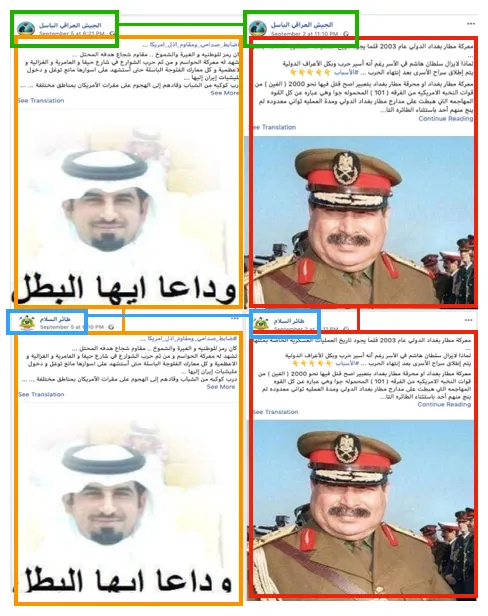
The majority of posts on both pages praised Saddam Hussein, including by suggesting that Saddam’s reaction to news of his impending execution was one of laughter, which was supposedly proof of his courage and masculinity; that those closest to him betrayed him and the new ruling class in Iraq cannot even compare to him; and that Saddam was a more humane leader than many contemporary leaders.
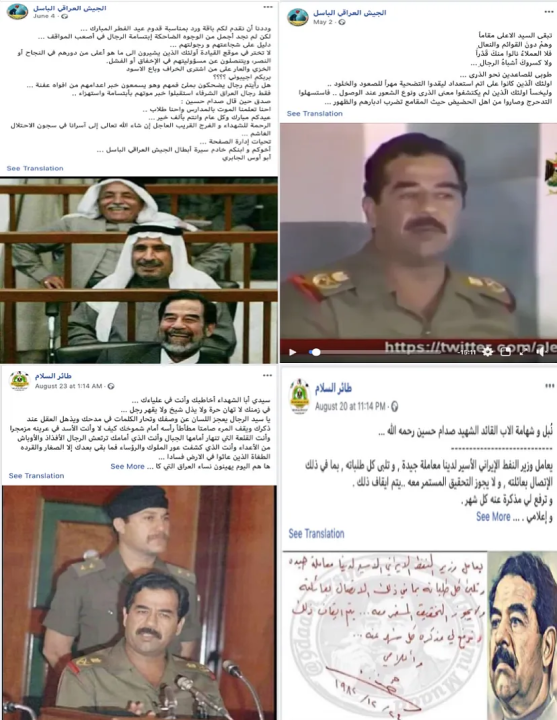
The identical posts, as well as the link to the same off-platform website in their respective About sections, suggested that the Brave Iraqi Army page and the Bird of Peace page may have either shared page administrators or coordinated with one another.
Coordinated behavior between Brave Iraqi Army and Bird of Peace
The Brave Iraqi Army page published its first army-related post on June 29, 2018; it was later shared by Bird of Peace.

From that time forward, Brave Iraqi Army focused on military-related content and posts on the two pages overlapped very often, with Bird of Peace almost always reposting the other’s posts and, less completely though still frequently, vice versa. Considering the above, these two pages appeared to be connected by June 2018, possibly with the Bird of Peace administrators taking over the Brave Iraqi Army page or by close coordination between the two pages’ administrators.
A CrowdTangle analysis showed that Bird of Peace page was the more active of the two, publishing many more posts per month on average than Brave Iraqi Army.
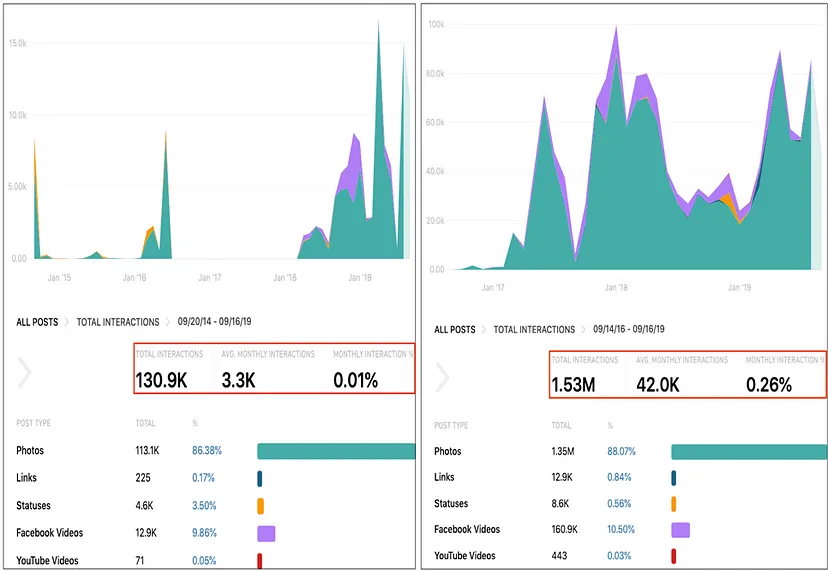
Al-Abbas News Network page
An additional army-related page, “Al-Abbas News Network,” was created in April 2015, with the most recent post to the page appearing in October 2017. The page changed its name twice, first from “Al-Abbas News Network” to “Holy Crowd News Network” on May 11, 2016, before reverting back two days later. The page was managed by 10 people, some of whom were based in Iraq, Egypt, and Belgium.

Al-Abbas News Network promoted the Abbas Combat Division, a Shia militia group that emerged to counter the Islamic State and Sunni Arab rebel groups in Iraq. According to the Washington Institute for Near East Policy, the Abbas Combat Division represents an effective volunteer force in Iraq against the Islamic State. The Al-Abbas News Network page used to post regular updates about Islamic State activities in Iraq and the combat division’s efforts to deter them. The page also previously accused the United States of providing chemical weapons to the Islamic State to attack a members of Abbas Combat Division in the Iraqi city of Samarra. The administrators of the page subsequently asked their followers to declare media jihad against the Islamic State.

Pushing anti-government and anti-U.S. content
The other assets in the removed set included pages that focused on sharing anti-Iraqi government and anti-U.S. content in addition to amplifying posts from the cohort of army-related pages.
The page “Clean Brotherhood” shared images of what it claimed to be Anbar Province in western Iraq and stated that the local government did not make an effort to combat poverty in the region. The page also claimed that the governor of Anbar did not keep his election promises and accused the government of stealing fuel and selling it on the black market.
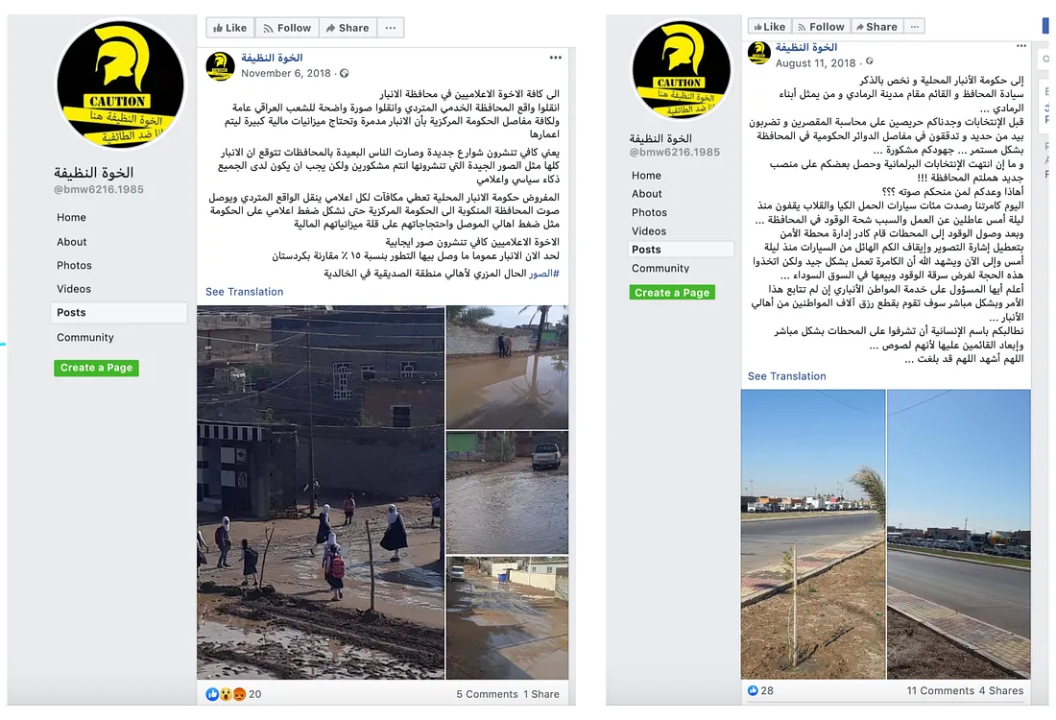
Clean Brotherhood and another page, “It’s Baghdad,” amplified a call from the Brave Iraqi Army page asking the international community to help the people of Iraq. The call was directed to the Secretary General of the United Nations, the United Nations Security Council, as well as to the heads of state of several countries. It accused “the irresponsible government of Iraq” of misappropriating public revenue received from oil resources and of looting the country. Referring to the current Iraq government as “the government that came to power after the American occupation,” the call-to-action accused Iraqi authorities of ushering in high rates of poverty and unemployment in the country, as well as creating a power vacuum for terrorists and criminal militias to exploit, which led to an increased number of kidnappings, assassinations, and bombings.
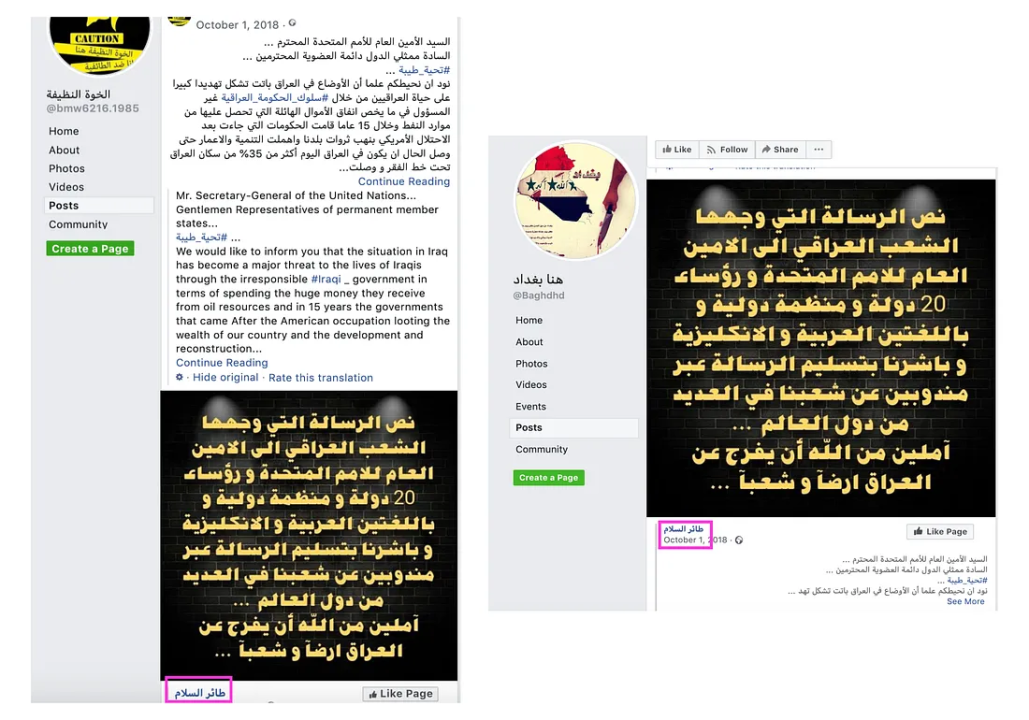
Another Facebook page, “Iraqi in Turkey,” which also shared posts from Brave Iraqi Army, claimed that the heroes of the former Iraqi Army defeated the “brutal occupation forces led by the United States.” The post glorified the former military elite of Iraq who “resisted the occupier.”
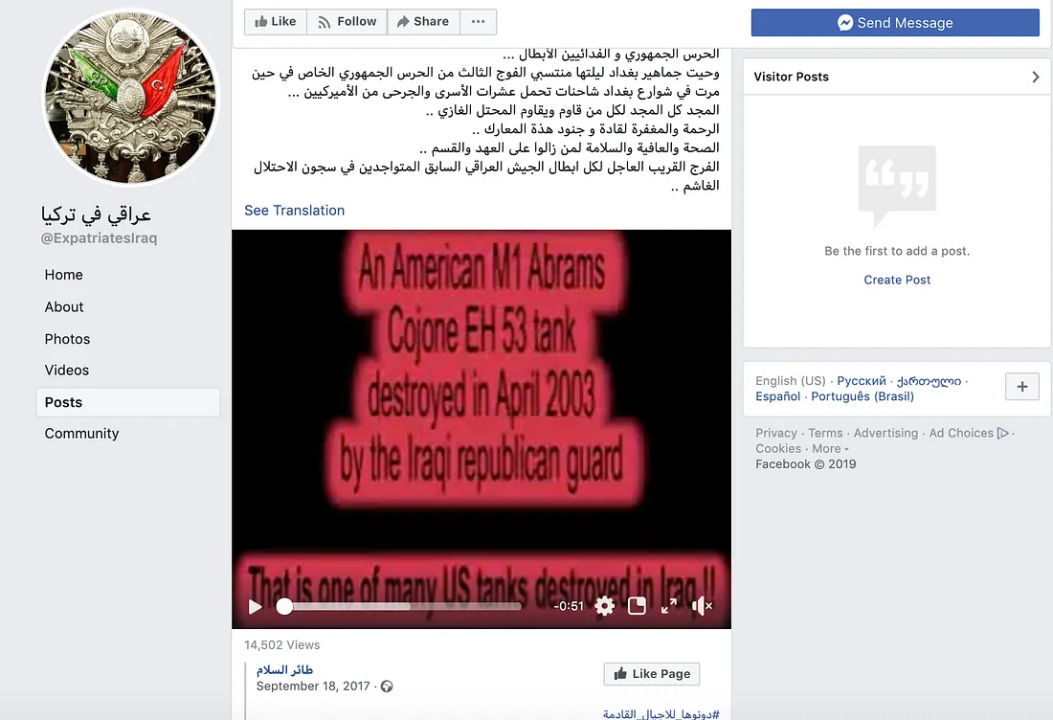
In addition to anti-U.S. content, the same page also shared posts that praised Turkish President Recep Tayyip Erdogan and his authoritarian style of governing. According to one of the posts, Erdogan does not lie to his people: “his tyranny, willingness to seize power, and oppression of opponents has made Turkey a great empire.” The post also suggested that the current Iraqi government failed to achieve a similar result.

In addition to promoting anti-government and anti-U.S. content, these pages amplified army-focused pages such as Brave Iraqi Army.

Overall, this network of pages presented content that was heavily ideological in nature, praising the Saddam Hussein regime while denigrating the current Iraqi government as well as U.S. involvement in Iraq. The DFRLab also found evidence that the pages regularly amplified one another’s posts, suggesting a high degree of coordination.
Follow along for more in-depth analysis from our #DigitalSherlocks.

